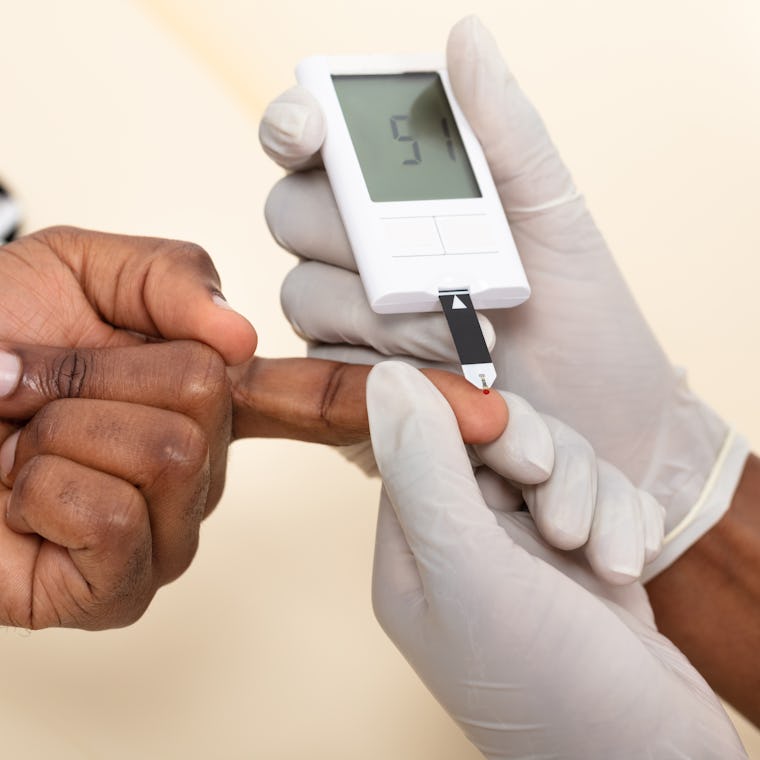What is diabetes?
Diabetes is a chronic disease that occurs either when the pancreas does not produce enough insulin or when the body cannot effectively use the insulin it produces. Insulin is a hormone that regulates blood glucose (also known as blood sugar). Blood glucose is the body’s main source of energy.
Insulin helps blood glucose get into the cells to be used for energy. For diabetes sufferers, this process is impaired. Over time, having too much glucose in the bloodstream can cause major health problems. Although diabetes has no cure, steps can be taken to control the disease and stay healthy.


Type 1 diabetes
Type 1 diabetes can develop at any age, but occurs most frequently in children and adolescents. With type 1 diabetes, the body produces very little or no insulin, which requires daily insulin injections to keep blood glucose levels under control.
Type 2 diabetes
Type 2 diabetes is more common in adults and accounts for around 90% of all diabetes cases. Type 2 diabetes affects the body’s ability to make good use of the insulin that it produces. The cornerstone of type 2 diabetes treatment is a healthy lifestyle, including increased physical activity and a healthy diet.

What are the causes of diabetes?
Too much glucose circulating in the bloodstream causes diabetes, regardless of the type. However, the reason why blood glucose levels are high differs depending on the type of diabetes.
Causes of diabetes include:
Insulin resistance: Type 2 diabetes mainly results from insulin resistance. Insulin resistance happens when cells in your muscles, fat, and liver don’t respond as they should to insulin. Several factors and conditions contribute to varying degrees of insulin resistance, including obesity, lack of physical activity, a diet high in refined carbohydrates, hormonal imbalances, genetics, and certain medications.
- Autoimmune disease: Type 1 diabetes presents when the immune system mistakenly attacks and destroys insulin-producing beta cells in the pancreas
- Hormonal imbalances: During pregnancy, the placenta releases hormones that cause insulin resistance. Gestational diabetes is possible if the pancreas can’t produce enough insulin to overcome insulin resistance. Other hormone-related conditions like Cushing’s syndrome can also cause Type 2 diabetes
- Pancreatic damage: Physical damage to the pancreas — from a condition, surgery, or injury — can impact its ability to make insulin, resulting in diabetes
- Genetic mutations: Certain genetic mutations can cause rare forms of diabetes. Family history and ethnicity can also play a part in contributing to the onset of diabetes
What are the symptoms of diabetes?
Diabetes symptoms can range from mild to severe depending on the type of diabetes and its rate of progression. However, while type 1 diabetes tends to present clear symptoms, the onset of type 2 diabetes tends to be slower, and some people may not notice any symptoms at all.
Type 1 diabetes symptoms include (the 4Ts):
- Toilet – going for a wee more often than usual
- Thirsty – constant thirst
- Tired – always very tired and having no energy
- Thinner – losing weight without trying to or looking thinner than usual
Above are the most common symptoms of type 1 diabetes, however, there are other signs and effects to look out for. These can include genital itching or thrush, cuts and wounds that take longer to heal, and blurry eyesight.
Type 2 diabetes symptoms include:
- Fatigue
- Weight gain
- Excessive thirst
- Blurred vision
- Sores take longer to heal
Type 2 diabetes symptoms are in conjunction with a high BMI, the elderly, or those with a pancreatic illness. To find out more information on the signs and symptoms of type 1 and type 2 diabetes, you can visit Diabetes UK.
What does a diabetes care schedule look like?
If you or a loved one suffers from diabetes then you know that daily management of the condition is critical to stay well. It also requires monthly, quarterly, and annual medical check-ups to track progress.
At Trinity Homecare we ensure that all our diabetes care plans for our clients include:
- Monitor blood sugar
- Take diabetes medicines
- 30 minutes (or the amount that is right for you) of physical activity each day
- Eat healthy natural foods, low in sugar, to keep blood glucose in range
- Check feet for skin or nail changes
- Get an A1C blood test (every 3 months if blood glucose is too high)
- Meeting with a primary care provider to review the care schedule and treatment plan
- Blood pressure, weight, and foot check
- Full physical check-up from the primary care provider
- Complete foot check
- Check cholesterol and body lipid profile test
- A complete (dilated) eye exam by an Optician
- Kidney tests
Avoiding diabetes complications
The complications associated with diabetes can seriously damage different systems in the body. It’s important to avoid these complications to stay healthy. Complications can be categorised as chronic (caused by long-term issues) and acute (that can happen at any time).
Chronic complications include:
Those suffering from diabetes can develop an eye disease called diabetic retinopathy. If retinopathy is diagnosed, usually from an eye screening test, it can be treated, and sight loss prevented.
Having diabetes can cause serious foot problems, which can lead to amputation if untreated. Nerve damage can affect the feeling in one’s feet and raised blood glucose can damage circulation, making it slower for sores and cuts to heal.
High blood sugar over a period of time can damage blood vessels. This can sometimes lead to heart attacks and strokes.
Diabetes can cause damage to the kidneys making it harder to clear excess fluid and waste from the body. This is caused by high blood sugar levels and high blood pressure. It is known as diabetic nephropathy or kidney disease.
Diabetes sufferers may develop nerve damage (neuropathy) caused by high blood glucose levels. This makes it harder for the nerves to carry messages between the brain and body.
High blood glucose levels can lead to more sugar in the saliva. This attracts bacteria that produce acid which attacks tooth enamel and damages gums. The blood vessels in the gums can also become damaged, making gums more likely to get infected.
People with diabetes are more at risk of developing certain cancers. And some cancer treatments can affect diabetes and make it harder to control blood glucose.
Damage to blood vessels and nerves can restrict the amount of blood flowing to sexual organs and may cause loss of sensation, or erectile dysfunction in men. Women are also more likely to get thrush or urinary tract infections.
How we provide care for those living with diabetes
Our award-winning home care services offer several ways to support those living with diabetes, or other chronic conditions.
Here are some of the ways we can support you:
Whether you need hourly care visits once a week, or someone to help you multiple times every day, our visiting care services are completely tailored to your needs. With Trinity Homecare by your side, you can remain safe, happy, and independent in your own home whilst a dedicated carer attends to all your care-related needs. Our team of visiting carers will be by your side whenever you need them to provide the highest levels of visiting home care.
A professionally trained carer lives with you in your home to provide full-time care whenever you need it. Live-in care is a welcome alternative to residential care. No upheaval or disruption and allows you to be independent, stay close to friends, keep pets, and maintain all your hobbies. Live-in care usually includes personal care, (washing, dressing, supporting morning and night-time routines), supervision of medication, helping with jobs around the house, cleaning, cooking, and companionship. We carefully select a carer who will suit your personality and lifestyle so you develop a personal bond.
Our respite home care services are called upon to provide temporary care and assistance when someone needs it. Typically, this covers loved ones, relatives, or professional care assistants that require time away from their clients. You can find true peace of mind through Trinity’s in-home respite care services, allowing your loved one to stay in the comfort of their own home with all their needs taken care of. In urgent situations, Trinity Homecare also offers emergency respite care.
Cost of diabetes care
The cost of diabetes care is dependent on the level of care and support you require. If you are receiving our hourly diabetes care the overall cost will be determined by the number of visits and frequency of visits to you at home. Visiting care starts at £28 per hour. Live-in care starts from £1,400 per week.
Our expert care team can conduct a free, comprehensive assessment of your needs in your home, or in the hospital if you are awaiting discharge. A personalised diabetes care plan helps us to truly understand what you need and therefore how much your diabetes care at home will cost.
For more information or a free no-obligation assessment get in touch with us today on 01908 183 4648 .
How do I arrange diabetes care?
If you or a loved one are considering diabetes home care Trinity Homecare can help. Rated as ‘outstanding’ by the Care Quality Commission (CQC), our care service provides you and your loved ones with all the support you need to stay healthy and live life to the full.
We offer a free enquiry and assessment service with no obligation. Our professional and compassionate team is available 7 days a week from 7.30am to 5.30pm to take your call. Contact us by phone on 01908 183 4648 , through email at enquiries@trinityhomecares.co.uk, or by completing our online enquiry form.












